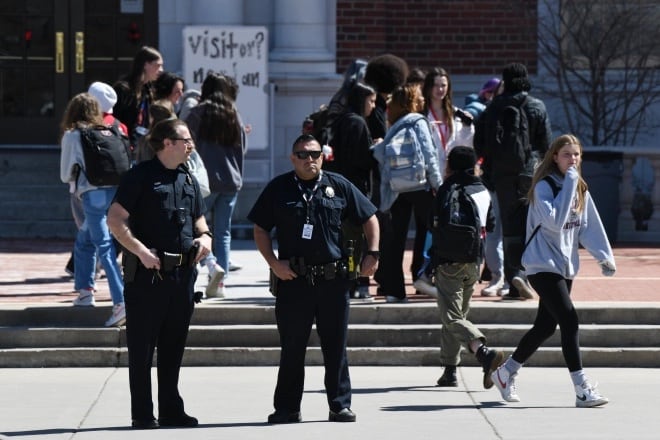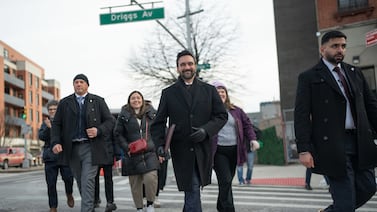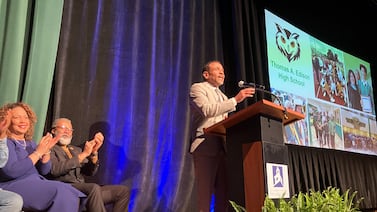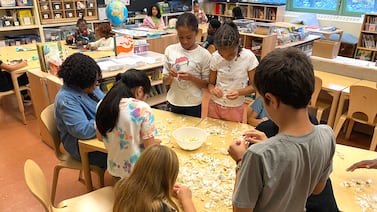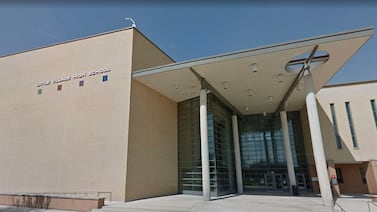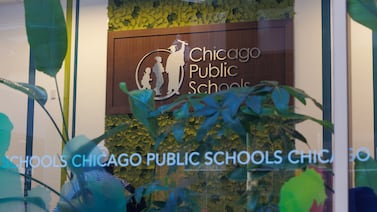Denver Public Schools will soon have a new chief of climate and safety: Greg Cazzell, who served for eight years as the director of safety for neighboring Aurora Public Schools.
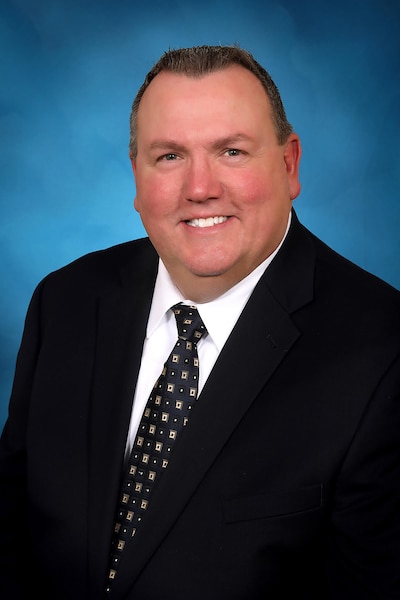
The DPS position had been vacant for six months when the district announced it had hired Cazzell, who spent 22 years with the Glendale police department before working in Aurora.
School safety is top of mind for many Denver students, families, and educators right now. Shootings in and around high schools this year have led to student protests, the formation of a parent advocacy group, calls for the school board to resign, a debate about whether to reintroduce school resource officers, and the development of a long-term safety plan.
Chalkbeat spoke to Cazzell Tuesday about his priorities and approach to safety before he officially starts the job on July 10. Here’s what he had to say.
You’re coming to DPS from Aurora Public Schools and a community that also has grappled with youth gun violence. What did you learn in Aurora that you’ll bring to Denver?
Community partnerships. Schools can’t do it alone. We have our students for about 7 hours and 40 minutes a day. And that’s just not enough time. So community partnerships, family partnerships, bringing all the stakeholders together to tackle some of the challenges.
If it’s violence in the community, it’s impacting our schools. So there’s no really differentiating between the two. Our students are in the community, they see the violence, they’re impacted by the violence. And so it takes not only the school district but nonprofits, community organizations, cities. It’s all-encompassing.
Is there an example of a partnership in Aurora that you’re particularly proud of?
I think the work that all of our after-school programs are doing: Boys and Girls Club, COMPASS, Rocky Mountain Kids. Those are all providing some after-school structure that engages the students, keeps them at the school, keeps them safe and part of that overwhelming umbrella.
And so all of those after-school programs, I’ve had great relationships with all three. And will continue to, I hope, bring some of those over to DPS.
The Denver school board is currently debating whether to lift a ban on school resource officers and allow police back into schools. Aurora Public Schools has had school resource officers for years. What is your opinion on SROs?
As you mentioned, they’ve been in Aurora Public Schools for over 20 years. We have two at every high school, along with an armed campus safety officer. So that’s the model that the superintendent and board of education in APS has adopted.
It’s a policy decision, and so that’s some of the debate you’re hearing right now in the DPS board meetings. And that will be the direction that I follow.
Students bringing weapons to school is a major concern. Some people have proposed installing metal detectors. Aurora has used drug-sniffing dogs that could also detect gunpowder residue. What approaches would you suggest Denver take to keep weapons out of schools?
All of the above would be kind of a good answer for that.
We really got to look at all of our technology, all of our options that may be beneficial to ensuring that we have a safe environment that’s conducive to learning. And that never stops. That is always going to be challenged. And we need to make sure we’re re-evaluating.
This isn’t a one-and-done comprehensive safety plan for DPS. It will have to be evaluated. We’ll have to determine what’s working, what’s not working. That will be the path forward.
I don’t think we should eliminate any of the options before us. But again, they’re all based on policy and what has the DPS board of education decided.
DPS said it was looking for a new safety chief with both “safety and security chops” and “a student-centric mindset.” District leadership has talked about the importance of disrupting the school-to-prison pipeline. Do you believe in that work? How would you further that work?
Absolutely. We need to make sure we are not criminalizing adolescent behavior.
So we need to work closely with our partners, whether they are the SRO that responds or any additional law enforcement component. We need to make sure that our staff understand the communities that our students are coming from, some of the challenges that they are faced with, and understanding that comprehensive approach to make sure that we’re not operating in a silo or a bubble. It’s important for us to get that big view of the big picture and realize how that impacts the day-to-day safety environment of our schools.
Why did you want the job in DPS?
Aside from the size of the two districts [Aurora Public Schools has about 39,000 students, while Denver Public Schools has about 88,000], I think they’re very similar. The socioeconomic makeup [of student families], the free and reduced-[price lunch] population.
I think Aurora is probably a little more diverse than DPS. I know DPS might not want to hear that, but Aurora is a very diverse community and we need to make sure we are recognizing that diversity, recognizing those refugee populations — I know they’re not limited to Aurora, clearly, but that’s been my experience — and making sure they understand what our role is in campus safety.
It’s important to understand we’re not law enforcement. We are safety-focused. And they’re coming from countries where they see the uniform and that’s what has been oppressive for them. So we need to make sure that we’re recognizing that diversity.
In the past, in DPS and in school districts all over the country, there has been that disproportionality in discipline. Some people call it over-policing students of color. How do you approach that and mitigate that?
It’s ongoing. There’s not one solution.
You need to look at that data. You need to make sure you’ve got the right people. If the board chooses SROs, we need to make sure that we’re working with Denver police and finding the right SROs that are going to fit with those schools, fit in with that school culture. Again, recognizing where those students come from, understanding their background. And again, making sure that the SRO, as well as my team, is a good fit for that school.
It didn’t happen often but there were times when we did go to Aurora police and say, ‘Hey, this person just isn’t fitting in well with this school. Let’s look at a different candidate to come on board.’ That may be an option should the board approve the SROs.
Again, my work is all based on policy. And so whatever that ultimate direction given from the board to the superintendent to me, that will be the direction I take safety and security.
Melanie Asmar is a senior reporter for Chalkbeat Colorado, covering Denver Public Schools. Contact Melanie at masmar@chalkbeat.org.

